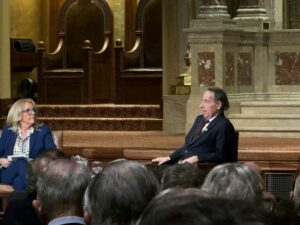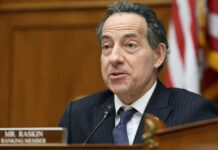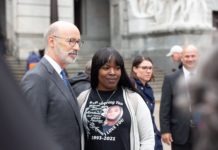
Stephen Silver
What’s the way forward in dealing with the gun violence crisis when lawmakers in both Harrisburg and Washington, D.C., are blocking changes in current laws?
Rep. Jamie Raskin (D-MD) visited Philadelphia on Jan. 24 to discuss on that subject at Congregation Rodeph Shalom in Philadelphia. The Jewish member of Congress was introduced by Gwen Rosenman Stern, a law professor at Drexel University’s Kline School of Law, and a longtime friend of the congressman. The event drew a crowd of about 350 people, enough to just about fill the synagogue’s sanctuary.
Raskin delivered a speech before taking written questions from the audience, and then spoke with congregants afterward, some of whom asked him to sign their copies of the Select January 6th Committee Final Report.
Indeed, the congressman is likely more qualified than most to speak on the constitutional aspects of gun policy: A graduate of Harvard Law School and one-time president of the Harvard Law Review, Raskin spent 25 years as a constitutional law professor at American University before his time in public office.
In his speech, Raskin discussed many of the Constitutional vicissitudes of the gun debate. He noted that last year nearly 43,000 Americans lost their lives to gun violence, in addition to 36,000 more who were seriously injured. Gun violence is the leading cause of death among young people in the U.S.
“The rates of gun violence in America are in a stratospheric place,” he said, “twenty times higher than the nations of the European Union … we do have guns that are shockingly, readily available to anybody who wants to get one.”
What can be done about the problem?
Raskin listed such proposals as universal background checks for gun purchases and closing the gun show loopholes in the Brady legislation, “red flag” laws and bans on assault weapons.
“We have huge numbers of Americans, huge percentages of Americans, who favor reasonable gun safety regulations,” Raskin said. “Don’t get me wrong, even if we do everything that [majorities] of people want, we would still be in a class by ourselves … but we if we closed all of them, we actually would be able to make some dramatic progress.”
But, he added, such proposals can’t even get a hearing in the Republican-controlled House.
Throughout his talk, Raskin frequently ripped the National Rifle Association, the powerful gun lobby that has stood in the way of any gun restrictions. He noted the script that seems to be followed after every major mass shooting: Republicans offer “thoughts and prayers,” Democrats call the situation intolerable and demand action, and then Republicans state that the Second Amendment makes any new laws impossible and accuse of them of “politicizing” the tragedy.
Raskin disagreed with the GOP talking point that the Second Amendment is about “maintaining within the citizenry the ability to maintain an armed rebellion against the government if they think it is necessary.”
Raskin’s talk at Rodeph Shalom was originally scheduled for October but was postponed when his presence was required in Washington for votes following the ouster of House Speaker Kevin McCarthy.
“You really have an extraordinary and beautiful synagogue here, and I am honored and delighted to be able to join you,” Raskin said during the event.
After Raskin spoke, Doug Rosenblum, an attorney and chairman of the synagogue’s Gun Violence Prevention Task Force, urged attendees to write a letter to a state Senate committee chairwoman urging her to take up a series of bills that have passed the state House.
Raskin, who is in his fourth term in the House of Representatives, serves as the ranking member of the Committee on Oversight and Accountability. He wrote a bestselling memoir called “Unthinkable: Trauma, Truth, and the Trials of American Democracy,” which covered the tragic death of his son, which took place only days before the Jan. 6 insurrection, leading into Raskin’s role as the lead manager in Donald Trump’s second impeachment. Raskin also revealed his diagnosis with cancer in late 2022, announcing the following spring that his cancer was in remission.
During his speech, Raskin joked that he didn’t want to jeopardize the institution’s 501(c)(3) status by engaging in direct politicking. He did, however, take a few shots at former President Donald Trump, including by poking holes in Trump’s defenses to the effort to disqualify him from the 2024 ballot under the 14th Amendment’s insurrection clause. He also referred to “our last great Republican president: Abraham Lincoln.”
Among the topics not addressed was the Israel/Hamas war, which was not brought up either in the speech or the Q&A period. Nor did Raskin much discuss his specific role as the ranking Democrat on the Oversight committee, where his Republican counterparts are pushing for the impeachment of President Biden.
Stephen Silver is a Broomall-based freelance writer.






